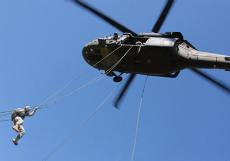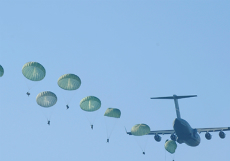Summer training
Through NAU ROTC, cadets have many opportunities to participate in Army schools and other types of training each summer. The slots for these events are highly-competitive, except for Advanced Camp, which is mandatory during the summer after the MSIII year.
Air Assault (Ft. Campbell, KY)

Air Assault school, conducted at Ft. Campbell, Kentucky, is two weeks of mental and physical challenges. This school is designed to teach air assault skills and procedures, improve basic leadership skills, instill the Air Assault spirit, and award the Air Assault Badge.
During the course, you will face such challenges as:
- Obstacle Course – You will be required to negotiate a demanding obstacle course.
- Physical Training – PT is conducted daily. Distance runs of up to three miles are standard.
- Rappelling – You are required to tie a series of knots and conduct graded rappels from walls and a UH-60 helicopter.
- Rigging and Sling Loading – You will be taught and tested on how to prepare, rig and inspect numerous pieces of Army equipment for helicopter transport.
- Road Marches – You must complete a 6-mile road march in 1 hour and 30 minutes or less; you must also complete, at the end of the course, a 12-mile road march in 3 hours or less.
- Evaluations – After each phase of training, all students are given a written and practical examination based on a PASS/FAIL system.
To graduate, the student must receive a PASS at the end of each phase. This course, like Airborne, is a fast-paced exercise in mental alertness and physical endurance. You must meet the high standards of the soldiers of the 101st Airborne Division (Air Assault) prior to being awarded the coveted Air Assault Badge
Airborne (Ft. Benning, GA)

The Airborne course is a three-week course that qualifies students as static-line parachutists. The course is conducted in a semi-boot camp atmosphere and is both physically and mentally rigorous. The first week of training is called “ground week,” during which cadets learn how to don the parachute harness, exit an aircraft, and execute a parachute landing fall. The second week is called “tower week.” Students practice mass exits from 34-foot tower, landings from the swing landing trainer, and practice riser/canopy control on the suspended harness for both the T-10C and the MC-1B/C. Students also conduct one drop from the 250 foot tower. The third week is called “jump week,” when students execute five qualification jumps from C-130 and C-141 USAF aircraft. The APFT is conducted on day one of training. All students must successfully pass the APFT, or they will be dropped from the course. All students must be screened prior to arrival ensuring that they have an Airborne physical, APFT score sheet, and age waiver (for over 35). Students must also be volunteers who are highly motivated.
Northern Warfare (Ft. Richardson, AK)
The Northern Warfare Training Center is very physically demanding. Students are taught basic mountain climbing and mountaineering skills including rock climbing, mountain walking techniques, basic knots, ice climbing, and route selection. The course is three weeks long with emphasis on mobility in mountainous terrain, glaciers, and inland waterways. Mountain phase includes climbing, rappelling, and medical evacuation. The river phase covers boat operations, stream crossing, and river charting, reading, and navigation. The Glacier phase covers crevasse rescue, step cutting, and anchors, and belaying and party climbing. The course culminates in a three-day field exercise that takes place on Gulkana Glacier. The importance of cadets trusting their equipment and building self-confidence is imperative.
Mountain Warfare (Ethan Allen Firing Range, Jericho, VT)
Mountain Warfare School, located in Vermont, is a four-week course. The course is divided into two phases: a two-week summer phase, and a two-week winter phase.
This course is physically demanding and mentally challenging for all who attend. Soldiers from other countries as well as Special Forces from all of the United States armed services frequently attend this school for some of the best mountain training in the world.
Cadet Leader Training
Cadet Leader Training (CLT) is a two track program consisting of Cadet Troop Leader Training (CTLT) and Drill Cadet Leadership Training (DCLT). Most positions are linked to a specific regiment of Advanced Camp. As a result, attendance to the specific regiment is mandatory.
The Cadet Troop Leader Training (CTLT) track provides Cadets the opportunity to experience leadership in Army Table of Organization and equipment (TO&E) units over a three to four week period. Cadets serve in LT level leadership positions in active duty units. Platoon Leader positions have a 3-4 week duration depending on the hosting unit and location. Assignments include units that are located CONUS and OCONUS. Cadets are assigned a unit mentor and are provided on-post lodging and meals via a Dining Facility. This program is exclusively designed for MSIII Cadets.
Drill Cadet Leadership Training (DCLT). The 4-week DCLT program provides Cadets serve in a platoon leader or executive officer positions in IMT companies and work closely with Drill Sergeants and other cadre. Cadets experience leadership training with Initial Military Training (IMT) Companies. Positions lengths vary in duration depending on the host unit and location. Cadets an opportunity to apply leadership skills, interact with highly skilled and experienced Noncommissioned Officers (NCOs) and drill sergeants, and improves common task skill proficiency in an Army training environment. Cadets must attend a Staff Cadre Training Course (SCTC) prior to training in IMT units.
Sapper Leaders Course
The Sapper Leader Course is a 28-day course designed to train joint-service leaders in small unit tactics, leadership skills, and tactics required to perform as part of a combined arms team. The SLC will teach cadets mountaineering, water jumping, demolitions, as well as many other engineer- and infantry-related tasks. This course is open to all qualified cadets and successful completion authorizes you to wear the Sapper tab. More information on the Sapper Leader Course can be found here.
Cultural Understanding Language Proficiency (CULP)
The CULP program offers cadets a unique opportunity to study foreign languages and cultures in a host country. Through this program, you can also earn credits towards a foreign language and earn incentive pay. To be eligible for the highly-competitive CULP program you must be contracted. For more information go to this link.